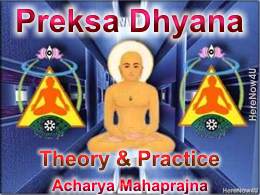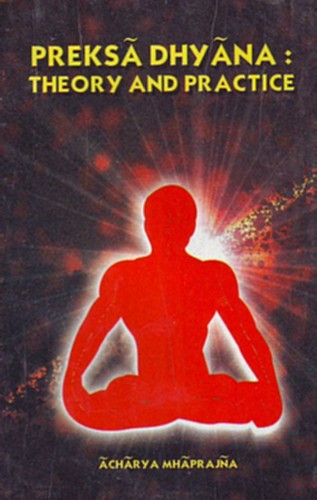
In publishing this book, it is hoped to bring to the reader, in simple language, some of the truths, already known to the ancient philosopher, and not known to modern science.
What is Preksa Dhyana?
Preksa-dhyana is a technique of meditation for attitudinal change, behavioural modification and integrated development of personality. It is based on the wisdom of ancient philosophy and has been formulated in terms of modern scientific concepts. We hope that the synthesis of the ancient wisdom and the modern scientific knowledge will help us in achieving the blissful aim of establishing amity, peace and happiness in the world by eradicating the bestial urges such as cruelty, retaliation and hate.
The different methods of preksa (i.e. perception) include svasa-preksa (perception of breathing), sarira-preksa (perception of body), chaitanya-kendra-preksa (perception of psychic centres), etc. All these are methods of ultimate transformation in inner consciousness, where, there is no need to sermonize for adopting virtues and giving up evils. When one starts practising perception, one experiences himself that he is changing, that anger and fear are subdued, that one is getting transformed into a righteous person.
Our series of 'Science of Living' include tracts on various facets of preksa-dhyana. This book is a composite tract covering all the facets of preksa-dhyana. The need for such a composite work has been felt for quite some time. The reader can now know everything about preksa-dhyana between the two covers. He need not go through several tracts separately. It should however be understood clearly that this book deals with the subject only in a concise manner. For greater details he will have to refer to various tracts already published.
Benefits of Preksa DhyanaPreksa may appear to mean different things to different people because it contributes to increase physical, nervous as well as spiritual energies.
On the physical level, it helps each bodily cell to revitalize itself; it facilitates digestion; it makes respiration more efficient and improves circulation and quality of blood.
On the mental level, it proves to be an applied method to train the mind to concentrate; it cleans and relaxes the mind; it offers a way to treat serious psychosomatic illness without drugs; it is an efficient tool for ending addictions and other bad habits; it reveals to one the mysteries of his mind by the realization of the real subconscious and the unconscious.
On the emotional level, the strengthening of conscious reasoning controls reactions to environmental conditions, situations, and behaviour of others; harmonization of the functioning of nervous and endocrine systems result in control and ultimate eradication of psychological distortions.
On the spiritual level, the firm control of the reasoning mind, regulation and transformation of blood-chemistry through proper synthesization of neuro-endocrinal secretions, and production of dispassionate internal vibrations lead one to attain freedom from anguish and infatuation, and to become free from the effects of mental afflictions and torments.
No Theological DogmaPreksa-dhyana can be learnt and practised by anybody without distinction of caste, colour, country and creed. There is no communal or theological bias, nor does it insist on any particular theological belief.
Though the process is not very difficult to learn and practise, it is essential to learn the technique through experienced and trained teachers. Normally a ten-day workshop (training camp) is a suitable means to acquire proper training.
Review of Benefits - A Retrospect
During the last fifteen years, more than 25 training camps have been organised and more than 14000 persons have been orientated in this technique. Amongst them are scientists, doctors, engineers, professors, government servants and other intelligentsia, besides the general public.
Here is a brief account
- Teachers' Training:
More than 600 teachers (both from Government and Private Schools) have been imparted training. They are now teaching the same to the students. The Education Officers have also been trained.
- Students' Training:
So far, nearly 55000 students have regularly learnt the subject. The objective and subjective assessments have given encouraging results.
- Police Officers' Training:
In an experiment, 100 police officers were given training through Rajasthan Police Academy.
- Business Executive and Professionals' Training:
Through Chambers of Commerce and such other Institutes short courses have been conducted.
Education Department and others have taken part in the special courses organised by Tulsi Adhyatma Nidam. More such courses are being planned for different disciplines, professions and work areas. Over and above those who have been trained in these camps, thousands of others have practised preksa-dhyana and have benefited thereby. While many of them have restored their physical health, hundreds of others have been cured of mental tensions, hypertension and other psychosomatic diseases.
Recently, some camps were organised in Medical College. The students and the teachers found the technique very scientific.
For all these, we are grateful to Ganadhipati Tulsi and his successor-designate Acharya Shri Mahaprajna for their constant guidance and efforts in this direction
These two great spiritual saints have truly blessed the entire human race with the boon of preksa-dhyana, and we are confident that all and sundry will be benefited by learning and practising this universal and easy-to-learn technique of preksa-dhyana.
Three permanent training centres have been established viz.
- Tulsi Adhyatma Nidam at Jain Vishva Bharati, Ladnun (Rajasthan)
- Adhyatma Sadhana Kendra at Chhattarpur Road, Meh-rauli, New Delhi;
- Tulsi Sadhana Shikhar at Rajasamand (Rajasthan).
30 June, 1994
Shankar Lai Mehta
Director
Tulsi Adhyatma Nidam,
Jain Vishva Bharati,
Ladnun, (Rajasthan)
 Acharya Mahaprajna
Acharya Mahaprajna

